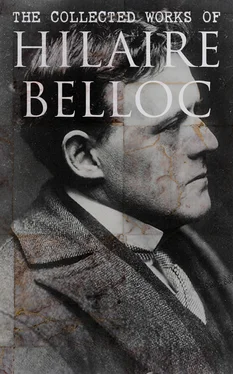VI
THE REVOLUTION AND THE CATHOLIC CHURCH
Table of Contents
The last and the most important of the aspects which the French Revolution presents to a foreign, and in particular to an English reader, is the antagonism which arose between it and the Church.
As this is the most important so it is the most practical of the historical problems which the Revolution sets the student to solve; for the opposition of the Church's organisation in France has at once been the most profound which the Revolution has had to encounter, the most active in its methods, and the only one which has increased in strength as time proceeded. It is hardly too much to say that the Revolution would, in France at least, have achieved its object and created a homogeneous, centralised democracy, had not this great quarrel between the Republic and the Church arisen; and one may legitimately contrast the ready pliancy of men to political suggestion and the easy story of their institutions where men knew nothing of the Church, with the great storms that arise and the fundamental quarrels that are challenged wherever men are acquainted with the burning truths of Catholicism.
Finally, the struggle between the Catholic Church and the Revolution is not only the most important and the most practical, but also by an unhappy coincidence the most difficult of comprehension of all the matters presented to us by the great change.
We have seen in this book that one department of revolutionary history, the second in importance, perhaps, to the religious department, was also difficult of comprehension—to wit, the military department. And we have seen (or at least I have postulated) that the difficulty of following the military fortunes of the Republic was due to the mass of detail, to the technical character of the information to be acquired and to the natural unfamiliarity of the general reader with the elements of military science. In other words, an accurate knowledge of great numbers of facts, the proper disposition of these facts in their order of military importance, and the correlation of a great number of disconnected actions and plans will alone permit us to grasp the function of the armies in the development and establishment of the modern State through the revolutionary wars.
Now in this second and greater problem, the problem of the function played by religion, it is an exactly opposite method which can alone be of service.
We must examine the field generally, and still more generally we must forget details that here only bewilder, and see in the largest possible outline what forces were really at issue, why their conflict occurred, upon what points that conflict was vital. Any more particular plan will land us, as it has landed so many thousands of controversialists, in mere invective on one side or the other, till we come to see nothing but a welter of treason on the part of priests, and of massacre upon the part of democrats.
Men would, did they try to unravel the skein by analysing the documents of the Vatican or of the French archives, come apparently upon nothing but a host of petty, base, and often personal calculations; or again, did they attempt to take a local sample of the struggle and to follow it in one department of thought, they would come upon nothing but a whirl of conflict with no sort of clue to the motives that lay behind.
The contrast between the military and the religious problem of the French Revolution is like the contrast between the geological composition and the topographical contours of a countryside. To understand the first we must bore and dig, we must take numerous samples of soil and subject them to analysis, we must make ourselves acquainted with detail in its utmost recesses. But for the second, the more general our standpoint, the wider our gaze, and the more comprehensive our judgment, the more accurately do we grasp the knowledge we have set out to seek.
We must, then, approach our business by asking at the outset the most general question of all: " Was there a necessary and fundamental quarrel between the doctrines of the Revolution and those of the Catholic Church? "
Those ill acquainted with either party, and therefore ill equipped for reply, commonly reply with assurance in the affirmative. The French (and still more the non-French) Republican who may happen, by the accident of his life, to have missed the Catholic Church, to have had no intimacy with any Catholic character, no reading of Catholic philosophy, and perhaps even no chance view of so much as an external Catholic ceremony, replies unhesitatingly that the Church is the necessary enemy of the Revolution. Again, the émigré , the wealthy woman, the recluse, any one of the many contemporary types to whom the democratic theory of the Revolution came as a complete novelty, and to-day the wealthy families in that tradition, reply as unhesitatingly that the Revolution is the necessary enemy of the Church. The reply seems quite sufficient to the Tory squire in England or Germany, who may happen to be a Catholic by birth or by conversion; and it seems equally obvious to (let us say) a democratic member of some Protestant Church in one of the new countries.
Historically and logically, theologically also, those who affirm a necessary antagonism between the Republic and the Church are in error. Those who are best fitted to approach the problem by their knowledge both of what the Revolution attempted and of what Catholic philosophy is, find it in proportion to their knowledge difficult or impossible to answer that fundamental question in the affirmative. They cannot call the Revolution a necessary enemy of the Church, nor the Church of Democracy.
What is more, minds at once of the most active and of the best instructed sort are the very minds which find it difficult to explain how any such quarrel can have arisen. French history itself is full of the names of those for whom not so much a reconciliation between the Revolution and the Church, as a statement that no real quarrel existed between them, was the motive of politics; and almost in proportion to a man's knowledge of his fellows in Catholic societies, almost in that proportion is the prime question I have asked answered by such a man in the negative. A man who knows both the Faith and the Republic will tell you that there is not and cannot be any necessary or fundamental reason why conflict should have arisen between a European Democracy and the Catholic Church.
When we examine those who concern themselves with the deepest and most abstract side of the quarrel, we find the same thing. It is impossible for the theologian, or even for the practical ecclesiastical teacher, to put his finger upon a political doctrine essential to the Revolution and to say, "This doctrine is opposed to Catholic dogma or to Catholic morals." Conversely, it is impossible for the Republican to put his finger upon a matter of ecclesiastical discipline or religious dogma and to say, "This Catholic point is at issue with my political theory of the State."
Thousands of active men upon either side would have been only too willing during the last hundred years to discover some such issue, and it has proved undiscoverable. In a word, only those Democrats who know little of the Catholic Church can say that of its nature it forbids democracy; and only those Catholics who have a confused or imperfect conception of democracy can say that of its nature it is antagonistic to the Catholic Church.
Much that is taught by the purely temporal theory of the one is indifferent to the transcendental and supernatural philosophy of the other. In some points, where there is contact (as in the conception of the dignity of man and of the equality of men) there is agreement. To sum up, the Republican cannot by his theory persecute the Church; the Church cannot by her theory excommunicate the Republican.
Читать дальше












